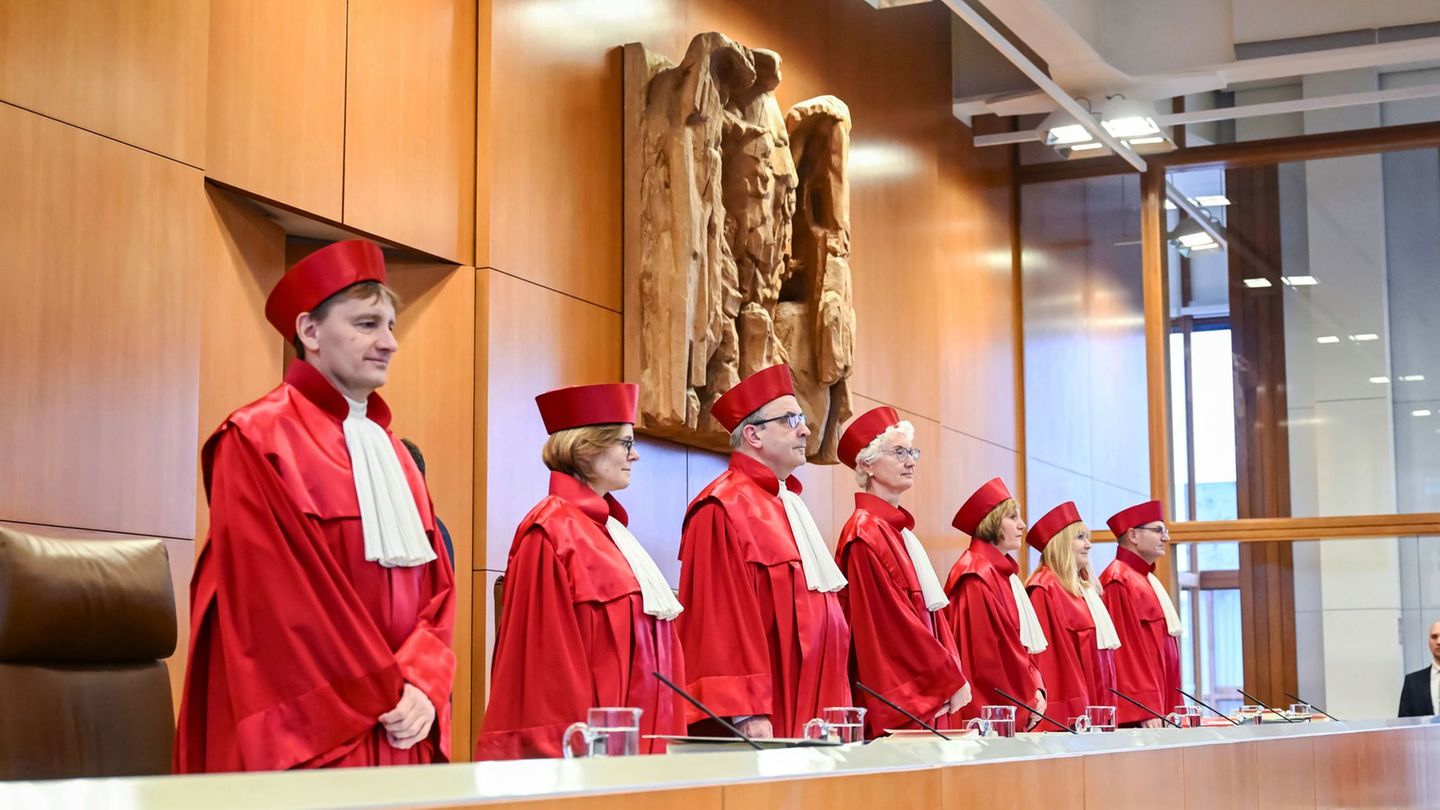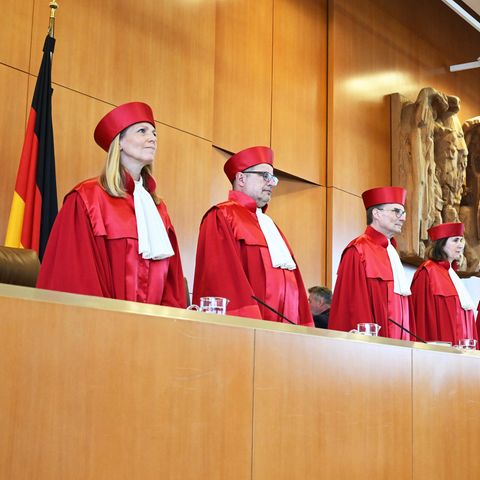Because of Afd and BSW
Bundestag decides on better protection for the Federal Constitutional Court
Copy the current link
The rise of the AfD and BSW is so worrying for other parties in Germany that the Bundestag is now changing the Basic Law. But what does that mean exactly?
By amending the Basic Law, the Bundestag wants to better protect the Constitutional Court from anti-democratic forces. A joint bill by the SPD, CDU/CSU, Greens and FDP was approved on Thursday in a roll-call vote with the necessary two-thirds majority. On Friday, the Federal Council is due to decide on the amendment to the Basic Law, which will enshrine the court’s essential structures in the constitution in the future. 600 MPs voted for the change – significantly more than the required two-thirds majority of 489. 69 MPs voted against the change.
The Federal Constitutional Court oversees the free democratic basic order and fundamental rights. In order for the Karlsruhe court to be able to fulfill this task in the future as it has in the past decades, a reform is needed, say legal politicians from several factions. The Bundestag has now voted for a corresponding project. An overview.
Why is there a reform of the Federal Constitutional Court now?
The AfD is the proverbial elephant in the room in this project. The federal party is being observed by the Federal Office for the Protection of the Constitution as a suspected right-wing extremist case. The fact that the AfD was recently able to make gains in the state elections in the east and in opinion polls has made politicians from other parties increasingly concerned about a scenario like that seen in Hungary and Poland under the government that has since been voted out.
A look at countries like Poland and Hungary has shown that even the strongest constitutional courts are vulnerable, says acting Federal Justice Minister Volker Wissing. “They quickly become targets of politics when critical judges make unpleasant judgments.” Therefore, better protection for Germany’s top constitutional guardians is urgently needed.
What had happened in Hungary and Poland?
The national-conservative PiS government, which led Poland from 2015 to 2023, restructured the Polish justice system and, according to experts, restricted the separation of powers. Among other things, the possibility was created to control and sanction judges. The new center-left government of Prime Minister Donald Tusk is trying to reverse the measures objected to by the European Union.
In Hungary, Prime Minister Viktor Orban is suspected of restricting the independence of the judiciary. “We are preventing, as happened in Eastern Europe, new constitutional judge positions being created that can be filled by favorites by creating new senates or lowering the age limit,” explained Johannes Fechner from the SPD at the first consultation on the planned change in the Bundestag .
What should now be changed in the Basic Law?
The twelve-year term of office of judges, the exclusion of re-election and the age limit of 68 years should be anchored in the Basic Law. These and other requirements regarding the status, structure and functioning of the court have so far been regulated by the Federal Constitutional Court Act. But this can be changed with a simple majority, unlike the Basic Law.
The definition of 16 judges and two senates should also be anchored in the Basic Law. To ensure that the court’s ability to function is not jeopardized in any case, the Basic Law should in future also state that a judge will continue to carry out his official duties until a successor is elected.
The same applies to the autonomy of the rules of procedure, i.e. the principle that the Federal Constitutional Court is allowed to regulate its internal affairs itself. This means, among other things, that the judges can decide for themselves in which order they process files. The aim is to prevent politicians from delaying certain court decisions.
What about the election of the 16 judges?
Half of them are elected in the Bundestag and the other half in the Bundesrat. In principle, it should stay that way. A two-thirds majority is required. This regulation has so far guaranteed that the parties have usually proposed lawyers who are considered to be more moderate.
In order to prevent the emergence of a blocking minority that blocks the election of judges if the majority situation changes in the future, the SPD, Union, Greens and FDP have agreed on a replacement election mechanism. It looks like this: If a two-thirds majority is not achieved, the right to vote can be transferred from the Bundestag to the Bundesrat and vice versa. When considering this point, the initiators of the reform not only thought of the AfD, but also of the Alliance Sahra Wagenknecht (BSW).
Why are two bills being voted on?
An opening clause for the new replacement election mechanism should be inserted into the Basic Law. Based on this opening clause, a corresponding change should be inserted in the Federal Constitutional Court Act.
Only the part of the project that affects the Basic Law is subject to approval by the Federal Council. A two-thirds majority is also required in the state chamber. It is to be expected that this will come about.
How urgent is the project?
There are divided opinions about this. After the state elections in Thuringia in September, the German Association of Judges declared: “In view of the recent election results, it is more urgent than ever to better secure the independence of the judiciary at the federal and state levels against targeted political interventions by illiberal, extremist forces. With the blocking minority “The AfD in Thuringia has already toppled its first domino.”
The legal policy spokesman for the Union faction, Günter Krings (CDU), emphasizes that he currently sees no reason for “alarmism”. Nevertheless, from his point of view, there is a lot to be said for “implementing this quickly.” He says that everything that concerns the structure and functioning of the Federal Constitutional Court has so far been regulated in a “very rudimentary manner, compared to other constitutional bodies.”
Note: This message has been updated.
DPA
mkb
Source: Stern
I have been working in the news industry for over 6 years, first as a reporter and now as an editor. I have covered politics extensively, and my work has appeared in major newspapers and online news outlets around the world. In addition to my writing, I also contribute regularly to 24 Hours World.





